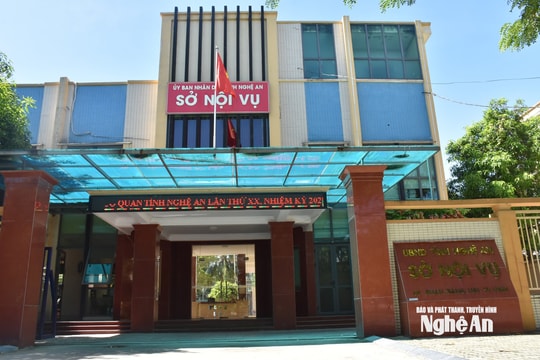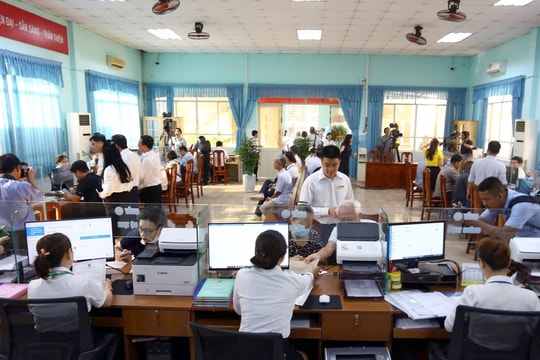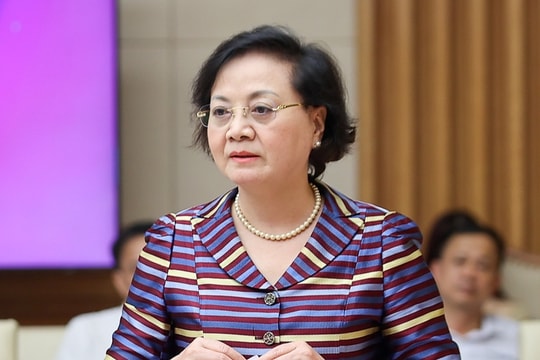Ministry of Home Affairs proposes appointing officials as managers for 5 years to avoid "sitting for too long and becoming an expert"
The Ministry of Home Affairs proposes that the term of appointment of officials to management positions is 5 years; when the term of appointment expires, consideration must be given to whether or not to re-appoint. This is to ensure a regular screening mechanism, avoiding the situation of “sitting for a long time and becoming an experienced person”.
The draft Law on Civil Servants (amended) supplements many new regulations to perfect management policies, develop civil servants, and at the same time tighten discipline and order in public service activities.
Civil servants may engage in professional activities in the private sector.
The draft law emphasizes that the State has a policy to build a team of civil servants with professional ethics and professional capacity, adapting to the increasingly high demands of society. Civil servants will be trained and fostered regularly to improve their qualifications, public administration skills, digital transformation capacity and public-private partnership.
Notably, civil servants can engage in professional activities in the private sector if the law does not prohibit it and the employment contract permits it, provided that there is no conflict of interest or violation of professional ethics. Conversely, public service units are also entitled to use high-quality human resources from the private sector to meet work requirements.
The salary and income policy for civil servants is designed to be fair, competitive, and linked to job positions and work results. For public service units with revenue sources, the draft requires the development of internal spending regulations as a basis for paying additional income and encouraging improvements in the quality of public services.
More clarity on appointments, dismissals and terminations
According to the draft, officials appointed to management positions must have a decision from a competent authority. If appointed to a new position, they will automatically resign from the current position, except in cases of concurrent positions.
The term of appointment is 5 years, unless otherwise provided by specialized laws. When the term of appointment expires, the competent authority must consider reappointment or non-reappointment. This provision is to ensure a regular assessment and screening mechanism, avoiding the situation of "sitting for a long time and becoming an experienced person".

Regarding termination of employment, the draft stipulates that civil servants are entitled to termination allowance, unemployment allowance or unemployment insurance in legal cases such as: Contract expires but is not renewed, both parties agree to terminate, resignation due to health or loss of civil capacity.
Conversely, an employee will not be entitled to severance pay if he/she is forced to quit, unilaterally terminates the contract illegally, or fails to fulfill his/her duties to the point of being fired.
Salary and bonus linked to work performance
The draft states that civil servants are entitled to salaries, bonuses and other incomes based on results, work products and effectiveness of the position held, while being consistent with the socio-economic conditions of the country, locality and the performance of the public service unit.
In addition to basic salary, civil servants are also paid for overtime, night work, business expenses, bonuses and other benefits according to regulations. In particular, those working in mountainous areas, border areas, islands, remote areas, ethnic minority areas or in toxic and dangerous environments will enjoy special allowances and preferential policies.
This is to ensure fairness and encourage staff to feel secure working in specific fields and locations.
A notable new point is that the draft law expands the rights of civil servants to participate in professional activities outside of prescribed hours, as long as it is not illegal and does not violate the signed contract.
Officials can sign contracts with other organizations and units or contribute capital, establish and manage businesses, especially in the fields of commercialization of research results, inventions and digital technology. In addition, officials can also be assigned to work at businesses, scientific organizations and universities for a certain period of time, but still maintain the same salary and policies.
For officials who are leaders, participation in extracurricular activities must have the consent of the competent authority. This regulation creates flexibility while ensuring strict management and avoiding conflicts of interest.
In addition to the actions that can be done, the draft law also adds a list of prohibited acts of civil servants.
These include avoiding and shirking responsibility; causing factions and disunity; voluntarily quitting work; participating in strikes; spreading false information that affects the reputation of agencies and units; taking advantage of professional activities to propagate against the Party's guidelines and policies, the State's laws or causing harm to the cultural and spiritual life of society; illegally using public property; discriminatory behavior, insulting the honor and dignity of others.





